Rotary level: principle of operation, rating of models and tips for choosing

No construction or repair work is carried out without taking the necessary measurements. To obtain accurate terrain parameters, many measuring instruments were invented, forming a group of geodetic instruments. One of them was the level. Like his other "fellows in the shop", he was constantly developing and improving, more accurate varieties were born. These include a rotary level, which makes measurements much easier.
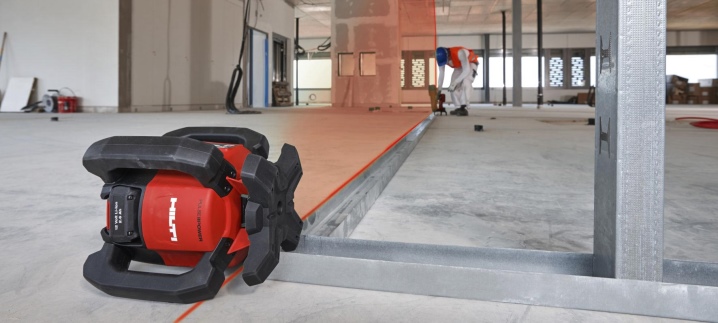
In this article, we will tell you in detail what this tool is used for, what technical features it has and on what principle it functions, as well as how to choose a level and which manufacturers to pay attention to.

What is it needed for?
The level is a highly specialized device and, unlike some theodolite, has a not so wide range of applications. Its main task is to measure the height of several points on the surface. Thus, the degree of unevenness of the relief is determined. This data is extremely important when constructing buildings. Also, with the help of a level, the quality of completed construction or repair work is assessed.

Today there are three main types of levels.
- Optic - the very first type of levels, which is distinguished by its simplicity of design. Equipped with lenses for taking measurements. You need to learn how to use such devices. But optical models are the most affordable.
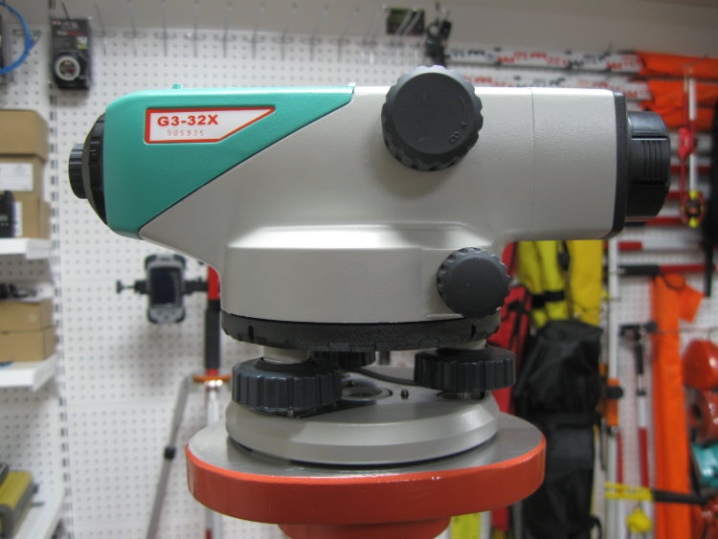
- Digital - a more modern and easy-to-use type of levels. It is distinguished by the presence of electronic elements such as a display and built-in memory, which allows you to save the received data.
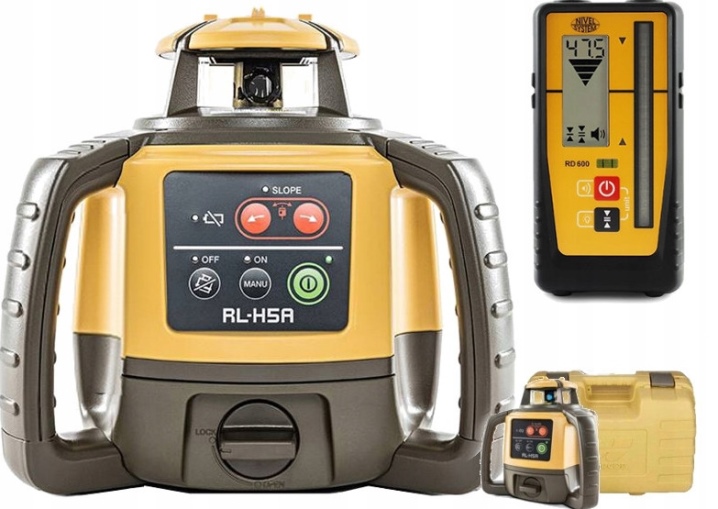
- Laser - the most advanced type of levels to date. It has a high precision that does not depend on the skill of the operator. It is in great demand among professional builders.

Laser levels, in turn, are divided into three more subtypes:
- linear;
- point;
- rotary.

We are talking about the last type of apparatus. It functions on the same principle as its predecessor, but is equipped with an electric motor. The motor allows you to move the level faster and smoother, because "rotary" means rotating.


Technical specifications
The most important in the level are six structural parts, which are needed for competent and accurate measurement of heights.
- Optical system - one of the most important elements. Lenses allow you to build a beam of a certain thickness and project it over long distances.
- Regulating mechanism - required for setting the level on the ground. Modern sophisticated models are equipped with an automatic deflection angle detection system, which further simplifies the operation of the device.
- Control elements - are available for all types of laser levels, however, rotary devices have a variety of functions. But despite this, it is quite simple to understand the management - just read the instructions.
- Light emitter - represented by a built-in LED that projects a beam on a plane. High power LEDs are used for long distance measurements. However, they consume the power charge faster and cause the machine to heat up. One level can have from one to three LEDs at the same time.
- Batteries - are needed for long-term operation of the level, since the rotary instruments are autonomous. This role is usually played by finger-type batteries or removable batteries, the charge of which lasts up to 10 hours of continuous operation. Powerful levels simultaneously require several power sources: separately for the electric motor and LEDs.
- Rotation controllers - allow you to adjust the speed of rotation of the movable head for a specific task.

Also, the rotary laser level has additional accessories in the kit, including consoles, targets and glasses, which facilitate the operation of the device.

Each model of the level has its own technical description, which details its characteristics. These include:
- extreme accuracy;
- the magnitude of the error;
- maximum distance;
- beam color;
- available features and capabilities.
Now that you have an idea of the parameters of the laser level and its structural elements, we can proceed to describe the operation of the device.

Operating principle
As we mentioned above, the principle of operation of the rotary level is similar to the operation of the point version. But still they have many differences, so it makes no sense to compare them. Rotary instruments are used for outdoor measurements. Spot are used for internal measurements. They are not protected from dust, dirt and moisture, because of the dim beam, it is difficult to identify the projection, and the range rarely exceeds 20 meters.

Let's take a look at the advantages of a rotary level over analog models:
- the ability to measure 360 degrees around the level;
- measurement in 3 different planes;
- long measuring range, which can reach 1000 meters;
- the ability to control the device using the remote control;
- comparatively low weight, facilitating operation.

It also has some drawbacks. However, there are not so many of them, and they are not so significant. First, the greater the projection distance, the higher the error. And secondly, the price is quite high. Rotary lasers are considered the most expensive type. But the cost is fully paid off by many useful features.

The level must be correctly positioned before taking measurements. It can be mounted on a tripod or rod. The first is used on the street, the second - inside buildings. The second important step is alignment. It is produced according to the built-in water level. Expensive professional models are equipped with an automatic leveling function. Now you can turn on the level.
If it is OK, the red or green LED will light up. If the instrument is repositioned, the alignment procedure will have to be repeated.

The measurement is performed by the interaction of the LED, lens and motor. When electricity is applied, photons are generated between semiconductors. They come out through a special hole in the buffer zone, aligning the beam. A lens is needed to focus this beam so that it is not scattered at a distance. The laser plane is created by continuously rotating the LED around its axis. Its rotation speed is 600 rpm.
The principle of operation may seem daunting, but most of the processes are automatic. The operator only needs to know the basics of operating a rotary level.

The laser device allows you to perform the following types of work:
- laying tiles;
- installation of drywall;
- gluing wallpaper;
- electrification works;
- furniture manufacture.

In some cases, the level can replace other surveying instruments, such as theodolite. It can be used to measure horizontal angles on the ground. However, the results obtained are not as accurate. Professional builders simultaneously have all the necessary measuring instruments in their arsenal.

Review of the best models
Speaking of the best manufacturers of levels, the first thing to mention is German company Bosch, which is known all over the world for the production of high quality household appliances and other electronic devices. In fact, the scope of this firm is much broader: it also includes automotive, industrial, construction technology, etc.
Bosch produces some of the finest level models.
But it cannot be said that the Germans monopolized the market for measuring instruments. Some manufacturers are not much inferior to them in terms of the quality of their equipment.

Here are the best models of rotary levels.
- Bosch GRL 300 HVG Set - the most popular device in many areas. Contains almost all functions available today. Very accurate, the margin of error is minimal. The projection length of the plane is 150 meters. The wavelength is approximately 530 millimeters. The cost starts from 90 thousand rubles.

- DeWalt DW 079 PKH - in terms of the number of functions it is inferior to the previous model, but surpasses in other parameters. For example, the wavelength is greater than 630 millimeters, and the projection length of the plane is 300 meters. Just like the Bosch level, it is equipped with an automatic leveling function. The price is about the same.

- Bosch GRL 250 HV - a cheaper model and less powerful, but no less accurate. Works at a distance of up to 250 meters. The wavelength is 635 millimeters. The design includes two LEDs. The cost is slightly more than 50 thousand rubles.

- ADA Cude 360 - an affordable option with an average power for little money. The working range is only 20 meters, which is quite enough for small-scale construction. The error is slightly higher than that of expensive models. But the average price is only 10 thousand rubles.

- Sokkia LP415 - model with good protection of the laser head. The measuring range is 150 meters. Includes a remote control, which greatly facilitates operation.

- ADA Topliner 3x360 - can build planes in all directions at the same time. The error is small, and the operating range is 20 meters. The price is slightly higher than that of the previous model from this manufacturer - 30 thousand rubles.

We also recommend paying attention to the levels from the manufacturers Hilti, Infiniter and Control. They have good performance and a very reasonable price.
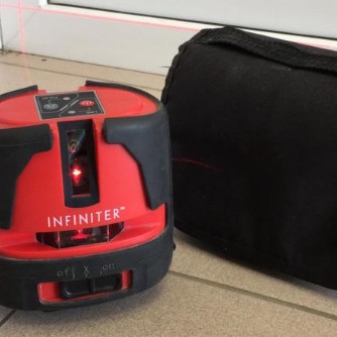

How to choose?
Of course, the above manufacturers and brands represent only a small part of the levels available on the current market. If you decide to find the model that suits you yourself, check out our tips. The cost for these devices starts from 9 thousand rubles and can reach 300 thousand.
It is important to have all the necessary features, but also not to overpay for unnecessary features.

When choosing, consider the following parameters:
- error - all models have, choose the one where it is lower;
- wavelength - determines the visibility of the beam at long distances;
- measuring range - for domestic use, a large range is not needed, moreover, the cost of the level depends on it;
- batteries - devices with built-in rechargeable batteries hold a charge longer;
- protection - protects the main elements from dust and moisture, models with a low level of protection cannot be used outdoors;
- temperature limit - determines at what air temperature the level can be used outdoors.
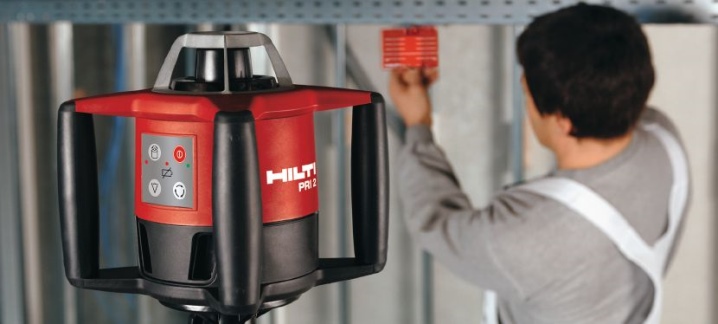
The complete set of different models may also vary. Additional tools include storage and transport bags, remotes, receivers, battery chargers and tripods. In some cases, you will have to purchase all this separately, but the most expensive levels often have it all in the kit.
It is also worth noting that, according to some buyers, green rays are more distinguishable when measured than red ones.
If you decide to get serious about construction work, for example, on your site, a rotary level will be of great help to you. Now you know enough to choose the right device and put it into practice correctly.

The following video provides an overview of the FIRECORE FRL 500HR (207A) rotary laser.













The comment was sent successfully.